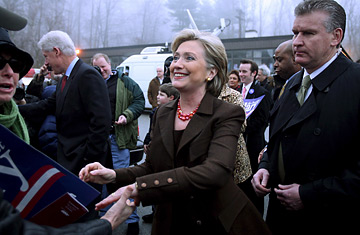
Hillary Clinton greets supporters after casting her vote in the New York primary in Chappaqua, New York.
Since the 2008 campaign began in 2006, it was fitting that election night came early, the anchors with their big screen maps, the countdown clocks and rolling tallies and vamping pundits as everyone waited for the polls to close and the answers to come, at the end of the beginning of the longest campaign ever. But unlike next November, when the maps and clocks will return, Super Tuesday has its own rules: for the candidates, coming in second actually counts for something, and beating your rival is not enough; you have to beat expectations as well.
Thus even before Barack Obama racked up his first win in Georgia, the Clinton campaign held a conference call with reporters and repeated four times its mantra that "the results tonight will be inconclusive." As exit polls pointed to strong Obama showings in what were once solid Clinton states, the Clinton campaign tried to raise the bar for Obama, suggesting that a failure to win California would be a setback after that Oprahpalooza over the weekend. Clinton's projected win in the Golden State was surely her biggest prize of the night, while victories in Oklahoma, Tennessee and Arkansas helped make her case that Obama is not the only one who can carry a red state. Latino voters, especially Hispanic women, continued to provide Clinton a crucial edge in states like New Jersey; when her home state of New York fell into her column, it was hardly a surprise, but still a relief.
All too aware after New Hampshire of the dangers of overpromising, the Obama team was pricking balloons right and left, calling it a win if they managed to keep Clinton from winning it all. "We're pleased with the movement that we've seen in the past seven or eight days," said campaign manager David Plouffe, "but again this was always a fairly daunting day for us and we are looking forward to moving beyond it because we get to states in smaller bite-sizes, two or three in a day." Obama could savor his big win in his home state of Illinois — since it was once Clinton's home state as well — as well as in Connecticut, Delaware and Utah. Once again, younger and more affluent voters provided the core of his support, along with African Americans, whom he won by an 8-1 margin. He won 70% of the half of Democrats who told pollsters they were looking for change; a quarter of respondents said they favored experience, and nearly all broke for Clinton.
John McCain had his own expectations to wrestle, having landed on the cover of both newsmagazines, invoked the wrath of the Talk Radio gods, cockily campaigned in Mitt Romney's home state as though determined to bury him there once and for all. McCain remained the Man to Beat, but his opponents were giving it their best shot. Seeing Romney closing in on him in California, McCain's forces joined hands with Huckabee's to deny Romney a victory in the West Virginia caucus; on the second ballot, with McCain's help, Huckabee won with 52% of the vote. Romney managed victories in his home states of Massachusetts and Utah, as well as North Dakota. But across the south, with victories in Alabama, Georgia and Arkansas, Huckabee demonstrated again that his faithful congregation is not ready to give up on him.
Still, McCain could feel some big gusts of wind at his back as the large, winner-take- all states began to report: he gained more delegates just from New York than he has won in total in all the races to date. He also carried New Jersey, Connecticut, Delaware, Illinois and Oklahoma, finally proving he can win more than 40% of the Republican vote, which going into Super Tuesday he had yet to manage in a party still ambivalent about the road forward.
Exit polls showed Romney still running strong among self-described conservatives and Huckabee among evangelicals. Whatever the final numbers tonight, in the days to come McCain will need to focus on the hard work of calming and coopting the conservative wing of his party, lest they peel off and stay home in November to plot the Restoration of 2012.
For all the focus on the candidates, their strategies and choices going forward, the clear winner of the night was known before the very first vote was counted. Despite floods in Indiana and tornadoes in Tennessee, a disaster declared in Chama, New Mexico, after 33 inches of snow, and temperatures at 50 below in Juneau, Alaska, still people voted. The storms took the power out at some polling places in Illinois and Arkansas, and one polling place in New Mexico had to be moved out of the snowbanks. But still people voted. "I don't usually vote in the primary," said Democrat Sarah Valenciano, 38, of New Jersey. "I am voting because this year my vote might actually make a difference." And that perception, so clearly and widely held, is a victory for everyone.
